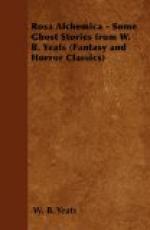all minds are continually giving birth to such beings,
and sending them forth to work health or disease, joy
or madness. If you would give forms to the evil
powers, it went on, you were to make them ugly, thrusting
out a lip, with the thirsts of life, or breaking the
proportions of a body with the burdens of life; but
the divine powers would only appear in beautiful shapes,
which are but, as it were, shapes trembling out of
existence, folding up into a timeless ecstasy, drifting
with half-shut eyes, into a sleepy stillness.
The bodiless souls who descended into these forms were
what men called the moods; and worked all great changes
in the world; for just as the magician or the artist
could call them when he would, so they could call
out of the mind of the magician or the artist, or
if they were demons, out of the mind of the mad or
the ignoble, what shape they would, and through its
voice and its gestures pour themselves out upon the
world. In this way all great events were accomplished;
a mood, a divinity, or a demon, first descending like
a faint sigh into men’s minds and then changing
their thoughts and their actions until hair that was
yellow had grown black, or hair that was black had
grown yellow, and empires moved their border, as though
they were but drifts of leaves. The rest of the
book contained symbols of form, and sound, and colour,
and their attribution to divinities and demons, so
that the initiate might fashion a shape for any divinity
or any demon, and be as powerful as Avicenna among
those who live under the roots of tears and of laughter.
IV
A couple of hours after Sunset Michael Robartes returned
and told me that I would have to learn the steps of
an exceedingly antique dance, because before my initiation
could be perfected I had to join three times in a
magical dance, for rhythm was the wheel of Eternity,
on which alone the transient and accidental could
be broken, and the spirit set free. I found that
the steps, which were simple enough, resembled certain
antique Greek dances, and having been a good dancer
in my youth and the master of many curious Gaelic steps,
I soon had them in my memory. He then robed me
and himself in a costume which suggested by its shape
both Greece and Egypt, but by its crimson colour a
more passionate life than theirs; and having put into
my hands a little chainless censer of bronze, wrought
into the likeness of a rose, by some modern craftsman,
he told me to open a small door opposite to the door
by which I had entered. I put my hand to the
handle, but the moment I did so the fumes of the incense,
helped perhaps by his mysterious glamour, made me
fall again into a dream, in which I seemed to be a
mask, lying on the counter of a little Eastern shop.
Many persons, with eyes so bright and still that I
knew them for more than human, came in and tried me
on their faces, but at last flung me into a corner
with a little laughter; but all this passed in a moment,




